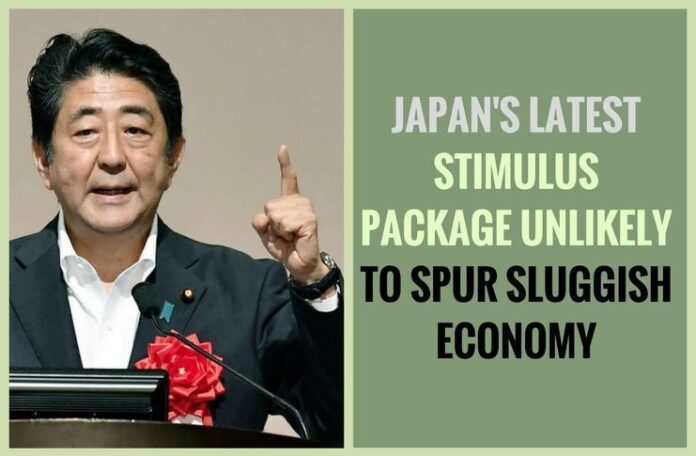
Japan’s latest stimulus package unlikely to spur sluggish economy
[dropcap color=”#008040″ boxed=”yes” boxed_radius=”8px” class=”” id=””]J[/dropcap]apan’s latest stimulus package, in the total amount of 28.1 trillion yen (around 275 billion U.S. dollars), is unlikely to pull the country out of deflation, according to Japanese public opinion.
Japanese Prime Minister Shinzo Abe announced on Wednesday a decision to introduce a stimulus package of 28.1 trillion yen to boost the country’s flagging economy, the third largest after the 2008 global financial crisisthe third largest after the 2008 global financial crisis, following 56.8 trillion yen (around 557 billion dollars) in 2009 and 37 trillion yen (about 363 billion dollars) in 2008.
The latest stimulus package is composed of three parts — national and local fiscal expenditures amount to 7.5 trillion yen (around 74 billion dollars), the Fiscal Investment and Loan Program (FILP) accounts for about six trillion yen (about 59 billion dollars) and investments from financial institutions and private enterprises account for 14.6 trillion yen (about 143 billion dollars).
[dropcap color=”#008040″ boxed=”yes” boxed_radius=”8px” class=”” id=””]T[/dropcap]he incentive aims to invest in infrastructure and improve public services in the country, in hopes to pull the Japanese economy out of the deflation quagmire.
However, Japanese economists fear Abe’s “investment in future growth” action may fail again this time.
” First, the Japanese government may find it hard to finance the latest package, as the government is facing a total of 1000 trillion yen (around 9.8 trillion dollars) of debt and a small budget surplus in 2015.
In order to fulfill the stimulus pledge, the Abe administration decided to issue construction bonds to fund stimulus spending, yet this will further worsen the government’s fiscal situation and make it more difficult to achieve a budget surplus by 2020, financial experts warned.
Second, Japan’s FILP, which collects idle funds from households and provides low-interest loans to enterprises, may find the money being spent on useless projects, which is a total waste of investment, according to Japan’s national daily, the Mainichi.
[dropcap color=”#008040″ boxed=”yes” boxed_radius=”8px” class=”” id=””]T[/dropcap]hird, private investment is also an unknown element. As the Japanese population is shrinking, there might be very few Japanese enterprises which desire to invest in and expand business in the country, the newspaper Asahi Shimbun said.
The latest stimulus plan, like previous “Abenomics” policies, will not drive the country out of a zombie economy, said Daisaku Ueno at Mitsubishi UFJ Morgan Stanley Securities Co., although the government expects the latest package to lift Japan’s gross domestic product (GDP) by around 1.3 percent over the next two years from the current level.
” The package includes investment in many public projects, which according to Chairman of the Japanese Communist Party (JCP) Kazuo Shii, is throwing money away by funding bankrupt public projects.
Takeshi Minami, chief economist at Norinchukin Research Institute, pointed out that the construction of transport infrastructure in big cities can facilitate private expenditure indeed, but projects like the construction of an agriculture and fishery product export base included in the package can hardly jack up the economy in the short run.
The government should be more patient and implement policies to help the Japanese economy to achieve long-term development, the Mainichi said.
Notes:
1. Xinhua
(This story has not been edited by PGurus.com and is auto–generated from a syndicated feed we subscribe to.)
- Pentagon cancels aid to Pakistan over record on militants - September 2, 2018
- The curious case of Tamil Nadu’s opposition to NEET - September 4, 2017
- If 2.6 Billion People Go To War: India vs. China - July 22, 2017











I am really foxed at how the foreign qualified economists will botch up our motherland in the end. The need of the hour is only agriculture and agriculture related projects such as water ,roads ,power, agricultural equipment, more modern agricultural technology , like Pomegranate grown in Kutch,better than in Israel after getting the technology from them, and improving upon it with local talent. If we can attack this area on a priority basis we will Sir win hands down. This is my humble view.